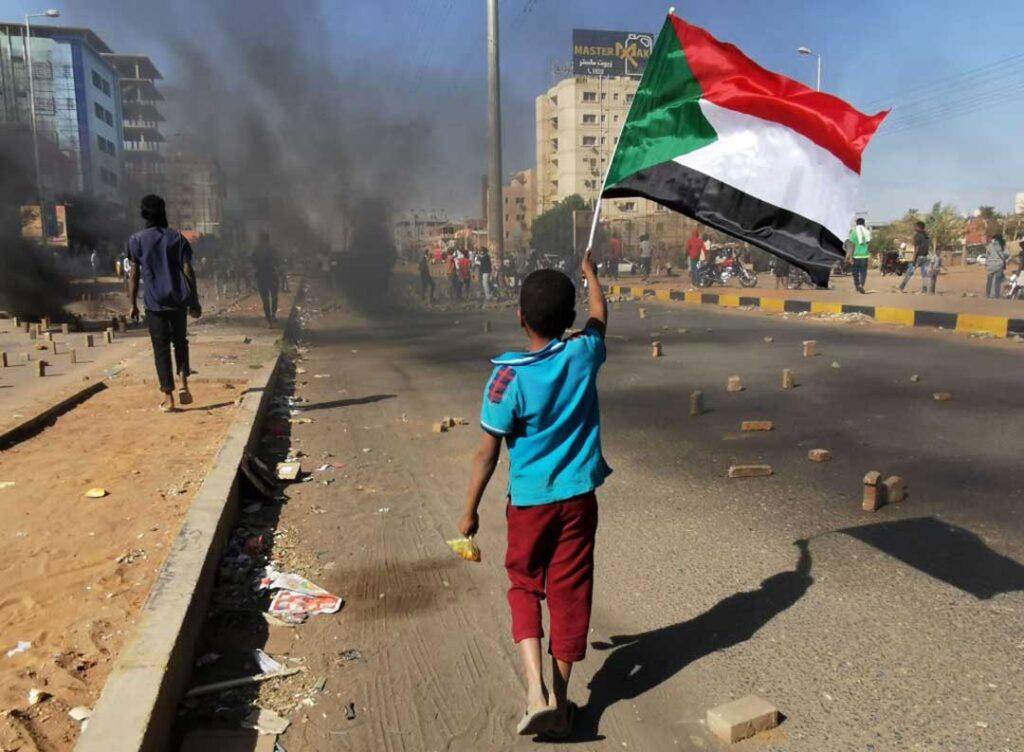ADF STAFF
In the months since Sudan’s military coup, protests and crackdowns by security forces have become regular sights on Khartoum streets. Dozens have been killed and hundreds injured as they demand the return of civilian rule.
Many in Sudan fear they lost their best chance at a transition to democracy when Prime Minister Abdalla Hamdok resigned January 2 after failing to find a compromise between the junta and the pro-democracy movement.
“I tried as much as I possibly could to prevent our country from sliding into a disaster,” he said in a speech. “Now, our nation is going through a dangerous turning point that could threaten its survival unless it is urgently rectified.”
Without mediation between the two sides, concerns are rising that the crisis in Sudan could worsen. Some pro-democracy protesters have begun referring to themselves as revolutionaries.
The Forces for Freedom and Change (FFC), an umbrella group of activists, issued a statement calling for “this period of civilian disobedience be a period of gathering, uniting and preparing our revolutionary forces to fight the decisive battle to overthrow the coup.”
On one side, the hundreds of thousands of mostly young people in the streets lack an organized body with which to negotiate. On the other, the coup leaders — Lt. Gen. Abdel-Fattah al-Burhan and Lt. Gen. Mohamed Hamdan Dagolo, who is known as “Hemeti” — are dead set against the idea of a civilian-led transition.
Al-Burhan, the chair of the Sovereign Council and acting head of state, says the junta will only transfer power to an elected administration, which they have scheduled for July 2023.
Earlier in January, the United Nations consulted with rival Sudanese factions to find common ground between the generals and the pro-democracy movement.
With the support of the international community, U.N. Special Representative Volker Perthes tried to move quickly.
“I do hope that these consultations can become something like a confidence-building measure and would help to at least reduce the violence,” he told reporters on January 10.
But protest groups and most of the political parties ousted have so far refused to negotiate, seeing the talks as a form of legitimizing the coup. Since the military takeover on October 25, 2021, at least 76 protesters have been killed, according to the Central Committee of Sudanese Doctors, which is aligned with the protesters.
The latest crackdown has complicated efforts to chart a path forward.
Laying out the options, Sudanese lawyer and legal commentator Ahmed el-Gaili believes the two extreme scenarios — with either side giving in completely — are unlikely.
“An election organized by the military would be theatrics,” el-Gaili told Foreign Policy magazine.
He similarly doesn’t see the junta resolving the crisis with violence and imposing authoritarian rule. Three other possibilities include:
- Sudan descends into civil war if protesters continue to be killed.
- The military steps down in a negotiated exit.
- The fragmented military spins off a countercoup.
“The streets clearly demanded an end to any participation of the military in power,” el-Gaili said.
Sudan’s teetering economy is one area many observers believe the international community could assist with targeted sanctions against the coup leaders.
One of many sources of discord between al-Burhan and Hamdok was the military-owned businesses in Sudan whose owners resisted the idea of returning to the private sector.
Hamdok, in 2020, pointed out that just 18% of state resources are in the hands of the government.
According to local media, the army and security services control 250 companies in vital areas of the Sudanese economy, such as mining and agriculture — exporting gold, rubber, flour, sesame and meat. They are exempt from paying tax and operate with no transparency.
“Every army in the world invests in defense companies,” he said to local media on December 14, 2020. “But it is unacceptable for the military and security services to do so in productive sectors, and thus compete with the private sector.”
Al-Burhan has only expressed a willingness to have the businesses pay tax.
With the majority of Sudan’s desperately needed foreign aid suspended, activists and analysts see an opening for change.
Sudan plans to use 70% of its gold export proceeds to fund strategic and necessary goods, such as fuel and wheat, its new Finance Ministry said January 3. The country is trying to fund an expanded budget without the billions of dollars of foreign aid the country was expecting before the coup.
Protest leaders have accused the generals of mismanaging Sudan’s economy and squandering the country’s oil and gold.
Inflation soared to 443% in December 2021, up from 163% a year earlier. There are shortages of basic commodities, from food to medicine.
Kholood Khair, managing partner at a Khartoum think tank called Insight Strategy Partners, suspects that discontent could be the beginning of the end of military rule.
“Sudan is careening towards economic collapse,” she tweeted. “The same endless cycle of high inflation and printing of money is underway. The solution is not resumption of aid. It is systemic changes to state-owned enterprises and the hegemony of militias on the economy.”

